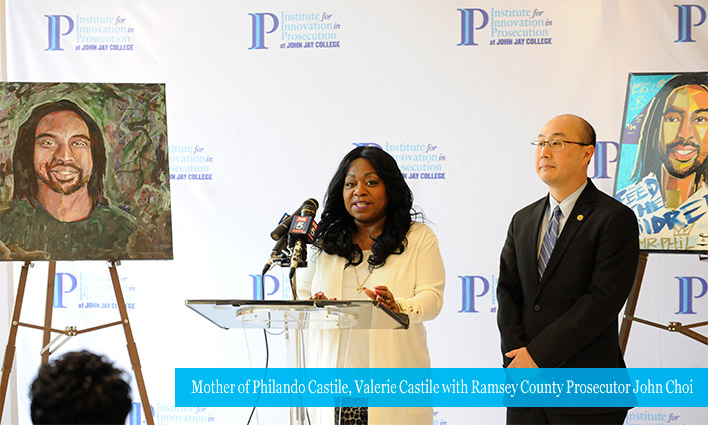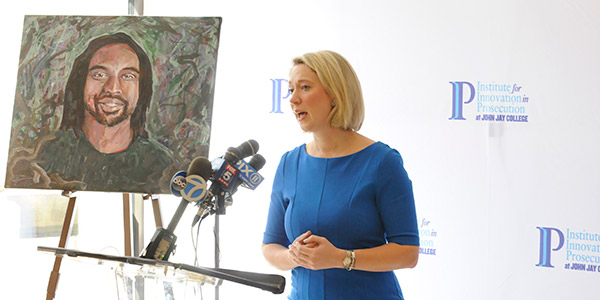
They’ve lost loved ones to police violence, but turned that pain into progress, working with prosecutors, police chiefs, policy experts and community advocates to create a new toolkit that can be used nationwide to help reduce officer-involved fatalities.
The toolkit, produced under the direction of the Institute for Innovation in Prosecution at John Jay College of Criminal Justice (IIP), was unveiled at the Schomburg Center for Research in Black Culture. It was the culmination of a year-long collaboration of 50 experts and family from across the country who met regularly at John Jay. The toolkit serves as a concrete action plan for state and local prosecutors and the communities they serve to prevent the use-of-force and creating a path to accountability for unjustified force.

“Few things contribute more to the tension between law enforcement and communities than the prevalence of police-involved fatalities,” said Lucy Lang, Executive Director of the Institute for Innovation in Prosecution. “These tragedies and the lack of trust that emerges are of pressing national importance. Despite the amount of public discussion around this issue, concrete actions are too few and far between, and prosecutors -- as local elected law enforcement officials -- can play a critical role in filling this gap.”
Approximately 1,000 people, disproportionately people of color, are killed in officer-involved critical incidents every year. An analysis by the Washington Post reports that between 2005 and 2015, only 54 police officers faced criminal charges for fatally shooting someone in the line of duty, and nearly half of such cases resulted in acquittal or dismissal.

“This attitude that the laws are such that we can’t get convictions and leaning on that as prosecutors just won’t do,” said Portsmouth Virginia Commonwealth's Attorney Stephanie Morales. “I know because I have gotten one after working very hard with my family and my community. But also there have been instances where the law is such that I can’t charge and I have come forward with a full report to explain my rationale, to help people who did not go to law school and who are not trained prosecutors understand what has happened in each and every case.”
Valerie Castile, the mother of Philando Castile, who was fatally shot by an officer during a traffic stop, was a member of the IIP working group. “My son was killed July 6, 2016. Since his death, I have been advocating for legislative changes because we cannot continue to lose our children because of the language of the law, the policies, the procedures, and the flawed training or lack of training,” she said. “We have had enough. I hope that prosecutors all over the United States will implement this toolkit into their offices and police precincts to ensure that we all get justice.”
Leaders from all sides of this issue - prosecutors, law enforcement experts, and family members directly impacted - emphasized the importance of taking this first step together.
“This toolkit provides meaningful guidance to prosecutors, police, and the communities they serve, in addressing officer-involved fatalities and critical incidents in a manner that respects both concepts. The process used to create the toolkit demonstrates the power of collaboration and reinforces the need to bring all stakeholders to the table, even those with varying and opposing views, when addressing our greatest challenges,” Ron Davis, retired police chief and director of President Obama’s Task Force on 21st Century Policing.
“It wasn’t just a group of prosecutors, and law enforcement and academics, said John Choi, the Ramsey County prosecutor whose office tried the police officer responsible for the death of Philando Castile. “It was most importantly also a convening, where the voices of impacted families could be at the table to speak about their experiences, he said. “And I think to be grounded in those experiences has been really beneficial for this work.”
Kadiatou Diallo’s son Amadou was killed 20 years ago in New York City. “I think the families will agree this is not about our sons and daughters anymore because they are not gonna come back. It’s for future generations,” said Diallo. “For the first time prosecutors sat with us and kept communication going between us. We’d like that to happen nationwide.”

Families represented in the working group included Castile, Diallo as well as Iris Baez, the mother of Anthony Baez, who died as the result of an NYPD chokehold in 1994; Valerie Bell, the mother of Sean Bell, who was fatally shot by NYPD detectives on the night before his wedding in November 2006; Gwen Carr, the mother of Eric Garner, who died as the result of an NYPD chokehold in July 2014; and Victoria Davis, sister of Delrawn Small, who was fatally shot by an off-duty NYPD officer in July 2016.
The Toolkit will be distributed to DA’s offices across the country. It includes a step-by-step process for prosecutors to use before and after an officer-involved critical incident occurs within both their office and their jurisdiction. The toolkit includes a data checklist, an investigative checklist and an action plan to ensure thorough, transparent, and timely investigations. It recommends that a dedicated staff meet with organizers, develop relationships with family members, and respond to the scene immediately.
“This toolkit is not just about a call for change in practice, it’s a call for change in the hearts and minds of everybody involved in the criminal justice system,” added Commonwealth’s Attorney Morales.



